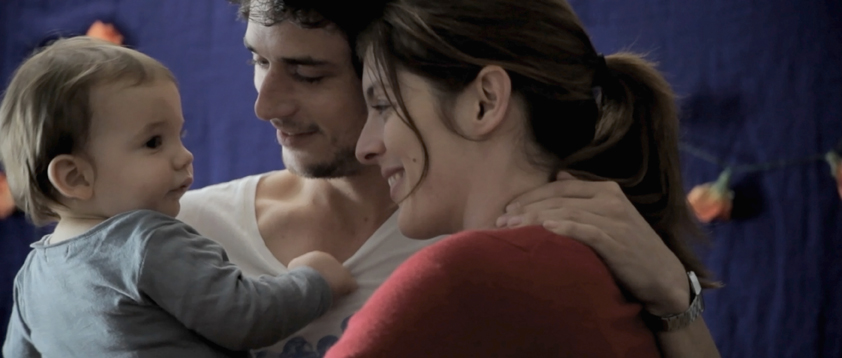
Jérémie Elkaïm and Valérie Donzelli, with baby Adam (Sundance Selects)
Whatever direction Valérie Donzelli takes in her second feature film, she goes all out. That all of her narrative detours don’t always fit in place is another matter. She deliberately shakes up your expectations, making her family-in-crisis drama insistently optimistic, and not a dirge. Though Donzelli and her cast don’t hold back, the movie feels half-measured.
It begins with a young mother (played by the director) taking her mop-headed eight-year-old son for a doctor’s appointment, an MRI scan actually, then jumps in time to her sipping beer at a darkly lit house party with the cool crowd, where she locks eyes with a scruffy, sleepy-eyed Romeo. He’s not just symbolically a doomed romantic figure, that’s his name, played by the film’s co-writer and Donzelli’s former off-screen partner Jérémie Elkaïm. Before they speak, he tosses her a peanut from across the room. His aim is true—she catches it in her mouth. In fact, they’re instantly in sync, and as we will see, they physically mirror each other, jogging or chain-smoking in unison. At first, she doesn’t believe that’s his name—hers is Juliette. They immediately smirk over the coincidence on behalf of the audience (but some eye rolling might come later). Though they wouldn’t be out of place in Williamsburg—they’re hip, but not insufferably so. The soundtrack, on the other hand, is a high-brow mix tape, from Laurie Anderson’s “O Superman” to Vivaldi.
A montage of their whirlwind romance backs up Paris’s romantic reputation. Then abruptly Donzelli bursts the couple’s insular frivolity in a brilliant transition, cutting from a close-up shot of Gustave Courbet’s still-graphic 1866 painting L’Origine du Monde to a close-up of a wrinkly brand new baby, their son Adam (again, a symbolic name). Then the nightmare-during-daytime begins. First, the scrawny newborn is a screamer. Once he’s on a regular feeding schedule, he calms down, but then as the months progress, he vomits his food, doesn’t learn to walk or play with others, and one side of his face swells. Whatever it is that is attacking their infant’s health, possibly fatally, Romeo and Juliette pledge to fight it rationally but diligently, while keeping their cool. They cut off ties to work and friends, and practically move into the hospital, caring for their son full-time.
Yet the title doesn’t fit. It’s too belligerent considering the benevolent movie characters, who go out of their way to have a positive and constructive attitude. (A TV news broadcast announces the 2003 U.S. invasion of Iraq underlines the theme of combat—with a leaden touch.) About the only thing Romeo and Juliette don’t do is break out with a cheery Rogers & Hammerstein number, though they sing a love duet of sorts, cooing come-ons like “I like your straight nose.” However, we, as an audience, want our characters to suffer. We’re supposed to triumph. It’s okay if they crash and burn on screen. And when they do here, it’s too much. It’s not that the reactions of the couple and their extended family aren’t justified (Adam’s condition becomes quite grave), but all of a sudden the cast channels the gusto of Anna Magnani, with two dramatic public meltdowns and one smashed beer bottle. Though Donzelli has stated that the facts of the story are very close to what she and Elkaïm experienced when their real-life son was also seriously ill, she insists this isn’t their story. A strong dose of realism adds another layer to the tonal mix in the hospital scenes filmed at the Gustave Roussy Institute, where the filmmakers’ son was treated.
Donzelli physically sprints through her scenes, and no sequence overstays its welcome. She also keeps the movie moving along at a clipped pace through the many camera tricks in her arsenal, like a zoom to a ringing telephone. Three narrators connect the vignettes, but the voice-overs are also an easy short cut to wrap the film up. Yet it’s only at the end that we find out an insightful bit of information that perks up the ears and sounds more dramatic than what we’ve seen, and we can’t help but think up another movie in our heads, one that’s not quite as nice.

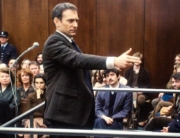
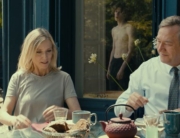
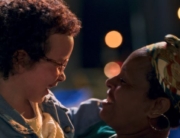
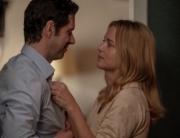
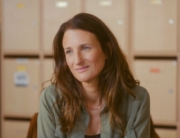
I know this sounds nitpicky, but it wasn’t a smashed cell phone; it was a smashed beer bottle.
Romeo and his buddy were walking, presumably home, following their house painting scene. Romeo was carrying a beer in his hand. When Juliette phoned him with the news of their son’s condition and he faltered, he dropped the phone on the ground and threw his beer bottle against a wall. His friend, then, seemed to have picked up the phone, because Juliette tells him to “Stay with him.”
Thanks. I made the correction.